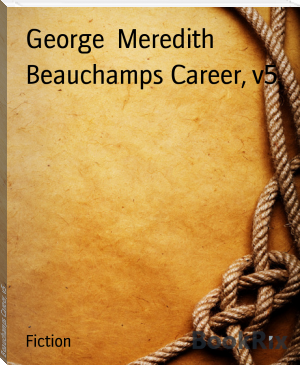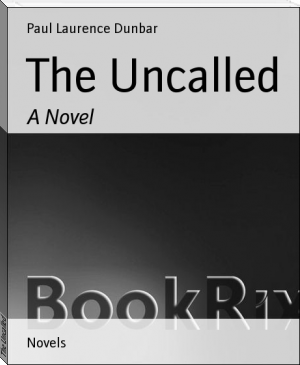Both Sides the Border: A Tale of Hotspur and Glendower by G. A. Henty (literature books to read .txt) 📗

- Author: G. A. Henty
Book online «Both Sides the Border: A Tale of Hotspur and Glendower by G. A. Henty (literature books to read .txt) 📗». Author G. A. Henty
Stooping low, they set off at a run and, being certain that the figures were making straight for the forest, they did not pause to get another glimpse of them, but ran straight on. They had gone some seventy or eighty yards, when they heard a stifled exclamation; and then, without further attempt at concealment, two figures rose from a bush twenty yards ahead, and fled for the forest. There was no more occasion for stooping and, at the top of their speed, Oswald and Roger pursued the fugitives.
These ran fast, but Oswald, who had outpaced his heavier companion, came up to them when within fifty yards of the edge of the forest; and, passing them, drew his sword and faced them.
"Surrender," he said, "or I will cut you down."
Instead of the fierce spring that he had anticipated, the two figures stopped suddenly, exchanged a word in Welsh, and then dropped their cloaks. To Oswald's astonishment, two young women stood before him. They evidently belonged to the upper class. Both were richly dressed. They wore heavy gold chains round their necks, and bracelets of the same metal; set, as Oswald noticed by the reflection of the moon, with jewels. They had also brooches, and their girdles were held in with massive gold clasps.
By this time Roger had come up, and stood staring with astonishment.
"Take these, good fellows," the girl said in English, as she began to unfasten her necklace. "Take these, and let us go. They will make you rich."
"I am an esquire of Sir Henry Percy," Oswald said, "and I rob not women. By your appearance, I should judge you to be daughters of Glendower."
"It would be useless to deny it," one of the girls said, proudly.
"Why do you come spying here?" Oswald said. "Surely, among your father's warriors, others better suited for such work might have been found."
"We were not spying," the girl replied. "We have lain hidden all day, and were but making our escape."
"How can that be, madam? We had a guard all round the castle, and know that none can have escaped."
"Being an esquire, you are a gentleman, sir, and will not disclose what I am about to tell you; though, indeed, now that our father's house is in your hands, it boots not much whether the secret is known. There is a secret passage from the castle that opens into these bushes, and it was through that that we issued out; having been in hiding all day, in the secret chamber from which it leads.
"Well, sir, we are your prisoners; and shall, I suppose, be sent to London, there to be held until our father is in the usurper's hands, which will not be, believe me, for years yet."
Oswald was silent. The two girls, some seventeen or eighteen years of age, both possessed singular beauty they had inherited from their father; and bore themselves with an air of fearlessness that won his admiration. He was still but a lad and, thinking of the years these fair girls might pass in a prison, he felt a deep pity for them. He drew Roger aside.
"What think you, Roger? Must we send these fair young girls to prison?"
"In faith, I know not, master. Having been shut up many a time in a cell, I have a sort of fellow feeling for prisoners; and indeed, two fairer maidens I have never seen. Our orders were to look after Welshmen, and see that they did not attack us. No word was said of Welsh women. And besides, they were running away, and not thinking of attacking us."
"That is all very well, Roger, but I cannot deceive myself. There is no doubt that it is our duty to take these two maidens prisoners, but my heart aches at the thought that they might pass years of their lives in a prison. They are not responsible for their father's misdeeds and ambition, and it may be that, if they are restored, Glendower may be induced to treat those who fall into his hands mercifully. None but ourselves know of this, and no one need ever know.
"I will risk it, anyhow," he said after a short pause. "I know that I am not doing my duty in letting them go; and that, were it ever known, I should lose all chance of further advancement, if indeed I did not lose my life. However, it need never be known, and my conscience would sorely trouble me, whenever I thought of them shut up in one of King Henry's prisons."
He turned to the girls again.
"Think you, ladies," he asked, "that were you in the king's hands, your father would make terms and submit himself?"
"Certainly not," the one who had spoken before said. "He has other children--sons and daughters--and he would not dream of abandoning his rights, and betraying his country, to obtain the liberty of two of us."
"In that case, then, your imprisonment would in no degree stop this war, or bring about a renewal of peace between the two countries?"
"Certainly not; and as for us, we would strangle ourselves in prison, did we think that any thought of us would turn our father from his noble purpose."
"Then in that case," Oswald said quietly, "it is clear that your captivity would do nought to bring about peace, or to allay the troubles that have now begun. Therefore I will take on me to let you go, though in so doing I may be failing somewhat in my duty. Only promise me that, in the future, you will use what influence you may possess with your father, to obtain kind treatment for prisoners who may fall into his hands."
The expression of haughty defiance, that they had hitherto worn, faded from the girls' faces.
"We shall never forget your kindness, sir," one said, in a low voice. "We thank you, with all our hearts; not so much for our own sake, as for our father's. He has been cruelly ill used. He has much to trouble him, and although I know that our captivity would not turn him from his purpose, it could not but greatly grieve and trouble him, and he has already troubles enough on his shoulders.
"Will you accept one of these jewels, as a token only of our gratitude for your kindness, shown this night to us?"
"Thanks, lady, but no gift will I take. I am failing in my duty, but at least it shall not be said that I received aught for doing so."
"Then at least--" the girl began, turning to Roger.
"No, lady," the man-at-arms said. "I am neither knight nor esquire, but a simple soldier; but I take no presents for saving two maidens from capture and captivity. I have been a monk all my life, though now a man-at-arms. Never before have I had an opportunity of doing aught of kindness for a woman, and I am glad that the chance has fallen in my way."
"May I ask the name of one who has done us such kindness?" the girl said, turning to Oswald.
"It were best not, lady. It is a service that might cost me my head, were it to be bruited about. 'Tis best, then, that even you should not know it. I doubt not that you would preserve the secret; but you would perhaps mention it to your father, and it were best that it were known to none."
The girls were silent for a minute.
"Sir," the elder said, after exchanging a word or two with her sister, "we would ask a boon of you. The successes in a war are not always on one side. My sister and I will think often of one who has so greatly befriended us; and were you, by any accident of war, to fall into the Welsh hands, and should evil befall you, it would be a deep grief to us. We pray you then, sir, to accept this little gold necklet. Its value is small, indeed, but it was given to me when a child by my father. My name and his are engraved on the clasp. Should you, at any time of stress, send this to my father; right sure am I that, on recognizing it, he would treat as dear friends those who have done so much for his daughters. I pray you to accept it, and to wear it always round your neck or wrist; and if it should never prove useful to you, it will at least recall us to your thoughts."
"I cannot be so churlish, lady, as to refuse your token so offered; and though I hope that it will not be needful to use it as you say--for, indeed, I expect to return very shortly to my lord in Northumberland--it will be a pleasant remembrance of the service that a good fortune has enabled me to render, to two fair maidens. Be assured that I shall ever keep your necklet, for the sake of the givers.
"And now, farewell! We must be back at our post, for the captain of the guard will be going his round, and we might be missed."
"We shall never forget you, sir. May the blessing of God fall on you, for your kind deed!"
"May all good fortune attend you!" Oswald answered; and then, with Roger, he made his way back to his post; while the girls hurried on, and entered the forest.
Chapter 11: Bad News."This has been a strange adventure, Roger."
"A very strange one, master. Lord Grey would tear his hair, if he knew that those two pretty birds had been hiding in the cage all day, and he never knew it. However, I see not that it can do us harm. Nay, more, there is a probability that it may even benefit us, for if it should happen, by ill fortune, we should ever fall into the hands of the Welsh, and they should abstain from cutting our throats then and there, perchance these young ladies would repay the service we have rendered them, by taking us under their protection."
"It may be so, indeed, Roger, though I hope that I shall never hear more of tonight's adventure. We may reason as we will, but there is no doubt that, although we had no instructions touching the capture of women, we have failed in our duty."
"That will in no way trouble me, Master Oswald. When I was a monk, I failed in my duty scores of times, and am no whit the worse for it; rather the better, indeed, since it is owing to my failures that I am now a free man-at-arms, instead of being mewed up for life in a convent. I shall not sleep one wink less, for having saved two of the prettiest girls I ever saw from having been shut up, for years, in a prison."
"I am afraid your sense of duty is not strong, Roger."
"I am afraid not, master, saving in the matter of doing my duty in face of an enemy."
"You mean, Roger, that you will do your duty when it so pleases you, and not otherwise."
"I expect that is the way with a good many of us," Roger laughed. "I wonder whether Lord Grey had any idea that Glendower's daughters were in the house when we arrived there?"
"I know not, but I remember now that they had men searching, for some time, for signs of secret passages. Whether it was from any idea that Glendower's daughters might be hidden away, I know not."
"Truly it might have been," Roger said, "for I saw, among the spoil that was carried off when the others rode for Chirk, some silks and stuffs that looked like feminine garments.
"There is somebody coming across from the next post," he broke off. "Doubtless it is the captain. You would not tell him what we have done?"
"Certainly not, Roger. My uncle is an old soldier, and though he would not, for my sake, say anything about it, I think not that he would approve of what has been done. 'Tis best, at any rate, to keep it entirely to ourselves."
"All quiet here, as elsewhere?" Alwyn asked as he came up.
"All quiet, Uncle."
"'Tis well; for although methinks that we could hold the place against the Welshmen, we could hardly hope that some of our posts would not be cut off, before they could reach the house. It is well to keep watch, but the more I think of it, the more I feel that Glendower will scarce attack us. He could not hold the place, did he gain it; and it might well be that, after we were turned out again, the place would be destroyed, seeing that it would need two or three hundred men to be shut up here, in garrison."
After waiting half





Comments (0)